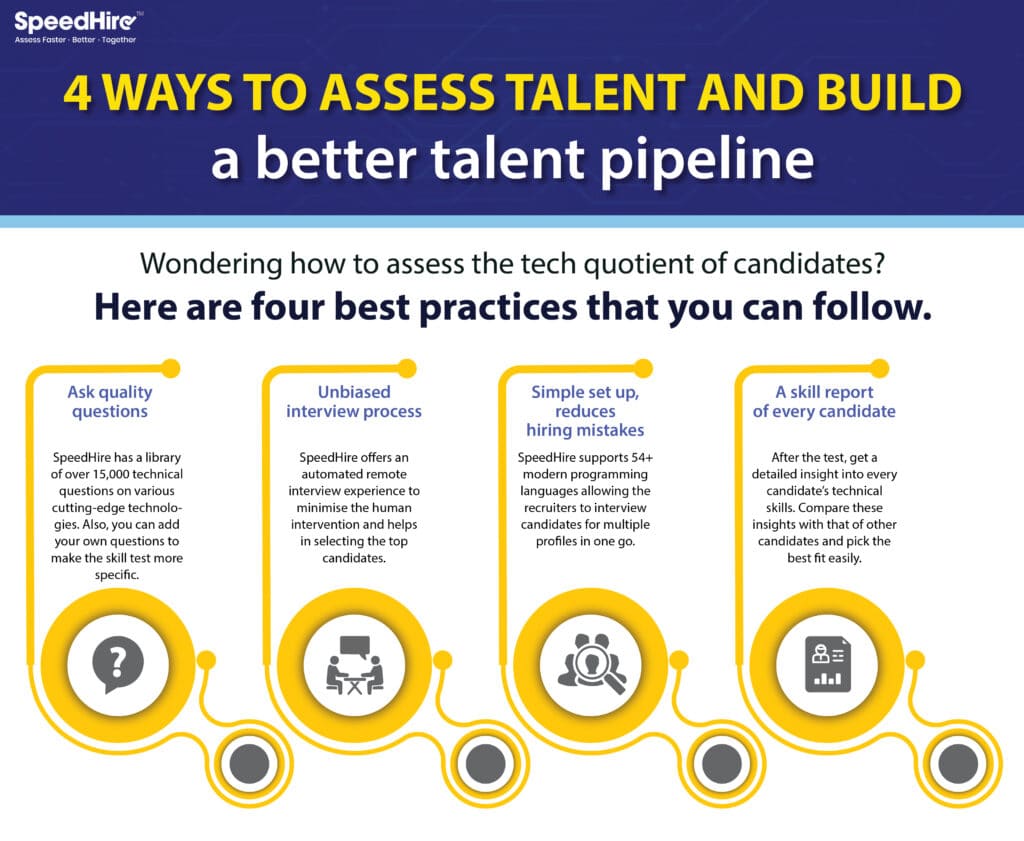To stay on top of the game and look for the best talents to join their team, organizations use different talent assessments and processes. Talent assessments provide businesses with vital candidate information on cognitive aptitude, behaviors, leadership traits, and emotional intelligence.
As they’re looking for top applicants for the job opening and to improve the productivity, efficiency, and quality of their teams, they use different assessment tools, including a pre screening test, a job interview, and so on, which we’ll discuss in a bit.
Without a doubt, your company will benefit from the experience, behaviors, traits, and knowledge of your staff. And that’s what exactly a talent acquisition process can help you with. It can provide you with more insights that go beyond the candidate’s resume or CV.
In today’s article, we’re going to talk about the importance of talent assessment tools and more. Keep reading to improve your company’s talent acquisition process.

Talent assessment defined
Talent assessment is a strategy to look for and identify the right recruit. It is a process composed of useful tools used for prescreening and recruiting.
This is a screening process to evaluate an applicant in different respects, such as aptitude, skills, perspective, and personality. It can also help you determine if the candidate is the right culture fit.
There are different types of a job assessment tool that an organization can use and offer them insights about the ability, behavior, traits, working styles, motivation, and readiness for the job of an applicant.
Based on the results of the different assessments, recruiting teams can make a decision based on their prediction of the candidate’s performance and success as well as retention rate.
A talent assessment isn’t only for a pre screening examination, though, as it can be useful for employee development and determination of a worker’s potential to be a leader.
Hiring teams and recruiters are doing the best that they can and use the most useful talent assessment method out there to source the best fit candidate. They try to modify their hiring processes not only to improve its efficiency but also to prevent bad hiring decisions that result in a lot of problems.
Hiring costs that include the different elements of the processes, such as screening, assessments, and selection is one. A bad hiring decision can also result in work disruption cost that can negatively impact the entire team.
Tools for Recruiting and Talent Assessments
Job simulation
This is a recruiting method that involves having potential candidates to work on job-related tasks in real-time. Recruitment professionals can use it to assess the applicants based on their performance on specific job-related tasks.
For example, if you’re hiring salespeople, a good job simulation procedure can be to ask them to make a sales presentation or on the spot showcase their ability to persuade or encourage buyers to try the product or service.
Nevertheless, a job simulator is a good assessment that will gauge a candidate’s skills and knowledge to take on the job. It is one of the main ways of measuring one’s thinking skills and performance.
Using simulators, HR professionals can test for the applicant’s competencies for the job as well as their personality. These also give candidates an insight of what a day like would be in the job. Such simulation methods can be done online or through hiring assessment tools.

Job simulators aren’t possible for all work types; however, they’re a useful strategy if you want to test the applicant’s skills in a simulated environment for a day or just a couple of hours.
You must be around while conducting this method and in order to assess the performance of the candidate. For the best results in these talent assessments, you might want to do it only for the top five candidates for the vacancy you’re looking to fill.
But nevertheless, simulations can be easier to manage because they can be done during the interview process. For example, you can ask your applicants to visualize a situation that they could encounter on the job and then ask them to explain ways that they would handle a particular situation.
Structured interviews
These talent assessments interviews involve asking all the applicants with the same question and in the same order. Such helps you concentrate on the skills of each one of them and reduce hiring bias that can occur in unstructured questions.
But then, you must be prepared for structured interviews and be able to take notes while conducting it so that you can also reduce recency bias. It typically happens when the interviewer only remembers the person that they interviewed last.
Structured interviews are effective in comparing applicants one by one based on their answers to the questions. In fact, during note taking, you can also consider making the decision based on your observations and notes. But as time is of the essence, you must only conduct this with a chosen few candidates who you think would meet the requirements.
Cognitive ability test (General aptitude test or intelligence test)
Cognitive tests involve gauging skills, including logical exercises, verbal reasoning, and numerical ability. They can also involve tests that gauge the attention to detail, problem-solving, and critical-thinking skills.
These can aid in assessing one’s overall intelligence, aptitude, and concept understanding. They can also gauge the person’s ability in solving basic numerical problems.
Aside from these, however, cognitive exams can also help in predicting performance of the applicant as well as making an accurate assessment of the different covered subjects, such as logical and reasoning.
They can also test one’s mind ability and in a limited period of time. Most of these tests are with a timer, that is. But to get the best results, ensure that you’re using a well-validated cognitive aptitude test for your organization.

Personality tests
These exams look to figure out a person’s thought processes and different behavioral traits, which are needed for the position. They can also help professionals check for the different attributes and multiple skills of the person. Some of the insights that HR professionals can gain from this assessment method include attendance, leadership, and creativity.
Such a talent assessment method can help you determine one’s conscientiousness. It is a person’s base motivation level as well as how much one cares about their work, performing it to their best.
It can also gauge one’s openness, which is one of personality traits included in the “Big Five Personality Theory.”
This indicates one’s openness to experience or trying new things. Thus, people with openness are said to be curious, open-minded, and imaginative. Oppositely, people who are not open-minded have a low level of openness and enjoy only routine rather than new things.
In addition, personality tests for talent assessment can help employers learn about a person’s kindness and sympathy. They can also tell about a person’s extraversion, which can help in identifying the social aptitude of the individual.
Personality tests, as a part of the hiring process, also allow hiring teams to check on a person’s ability to handle negative emotions and instability.
Besides the above, there are other tests that can be used in recruiting and determining the right fit for an organization. Other tests –
Psychometric exams
They aim to measure a person’s four human personality aspects to identify if the person matches the requirements. These are the positive personality traits; motivations, values, and preferences; cognitive abilities; and dark personality traits.
Behavioral exams
They aim to measure a person’s human behavior and behavioral competencies, including personality traits, skills, and knowledge.
AI-powered proctoring
Human-based and artificial intelligence based proctoring aim to check the behavior of the person as well as their actions for any suspicious activity. On the other hand, there is also a remote proctoring technology that can help a recruiter in removing impersonation risk through different authentication factors.
Technical exams
Another testing method used for recruiting professionals in assessments are technical tests that can assess the person’s subject knowledge in terms of a specific area, such as operations, marketing, and sales.
Why Talent Assessments Are Important
Talent assessments are valuable and effective. Especially now that businesses should keep up with the latest changes brought about by the pandemic, they should stay on top of their game to find the best fitting talents for their organization. Here are the advantages of using validated talent assessments.
Aids in building an efficient and quality team
Teamwork is a crucial aspect of a team because it enables working seamlessly and collaboration among team members. However, this is much influenced by the traits and behaviors that you have identified in the talent assessment.
The manner in which a person is influencing others or making decisions are crucial in thinking about alignment’s importance as well as problem solving and diversity of thinking’s significance.
How’s your team helping your business grow? Are your people using figures, logic, and facts in persuading and implementing change?
There are more questions to answer, but a proven talent assessment process can help you with the information you need to consider what you really need and how prospective applicants can support your business goals.

Makes onboarding a new hire easier
Onboarding should smoothly integrate the new hire into your team and give them everything they need to become successful. Effective talent assessments can help you plan the onboarding process.
With knowledge on how to best align and motivate your best person and ways you can do it remotely increases the initial onboarding discussions’ effectiveness.
Introduces a realistic job preview
To hire the top talent for your company, you must consider a realistic job preview (RJP) that from the beginning gives a candidate a clear picture on what to expect on the job. Thus, one can manage their expectations before even accepting an offer.
An assessment can embed an RJP in the recruiting process in the form of a simulation strategy. This can give an applicant a quick preview of what the job would look and feel like.
When you recruit a candidate, giving him or her a realistic job preview can avoid disappointment and frustration on the part of the candidate if he would be working for you.
Using this method, your organization can also avoid early turnover that typically happens when a new hire quits within the first six months on the job.
But by using simulation in your talent assessments, your company can give a smooth candidate experience and introduce your culture to the prospective candidate. You’ll also have the chance to check if the candidate can effectively perform what is required.
Can be better than interviews alone
Using a talent assessment tool can be better than using traditional interviews alone. In fact, interviews alone won’t be able to help you gauge a candidate’s abilities and skills. That is why you need to use a talent assessment tool for it.
For one, the data that you can gather from the process will be real information, which you can discuss with the applicants.
Such an assessment tool to hire top talent will help you figure out the strengths of the person as well as the areas that they can improve on. You can also use the tool for assessing talent in creating a more effective interview.
HireNest offers you easy to use recruiting and assessment tools to help you create a strong and quality team with the best players to drive your company’s growth. It can also help you create a custom talent assessment for your applicants and at the same time while you’re evaluating them based on the factors most important for you.
Good talent assessments to recruit top talent can help you identify gaps in skills, capacity, and knowledge
Validated talent assessments can aid hiring teams in identifying the areas that new hires will need more guidance or training on. You can use the insights from the results if you want to develop a new training program that will give your candidates enough practice in specific areas where they need the training.
You might also like: Mobile Recruiting: Is Mobile Recruitment the HR Secret 2022?
Talent assessment tools work to provide you with essential data
With real-time, accurate data, you will understand what your hiring problems are – bad hires, long time-to-hire, poor candidate experience? Or are you losing people because they’re not fit for your company culture or because you don’t offer a competitive pay?
Using an assessment tool and making it work for you, your organization can have strong and accurate analytics – with real data – that gives you a clear view of the things that affect employee performance.
Talent assessment tools can be taken using a dedicated software platform or online. Employers can either choose to share or not share the specific results with the applicants.
However, companies should keep the candidates informed about the results of their application for a smooth candidate experience.

Final Thoughts
Your company might want to look into creating a specific, solid, and precise talent assessment process or strategy, while also ensuring it is unbiased, objective, transparent, and fair.
Why? Implementing the right method for talent assessment can help you find the right candidates and avoid costly mistakes. This will also help you avoid the hiring bias, while ensuring you’re hiring a diverse workforce.
What do you think about your company’s current talent assessment? Tell us in the comments. Finally, share this article on social media to help fellow HR professionals improve their overall hiring strategy and process today!
FAQS
What are talent assessment tools?
Again, talent assessment forms can include but not limited to…
- Structured interviews
- Sample work or simulation
- Personality tests
How do you evaluate talents?
You evaluate candidates based on the things that matter to your organization. That’s why you need careful consideration on which among the available assessment tools to help you meet hiring goals.
What is a recruitment assessment?
Usually, it’s an assessment tool or a web application to improve the hiring method and processes of a company. It also helps identify the right talent to move through the remaining recruiting steps.
